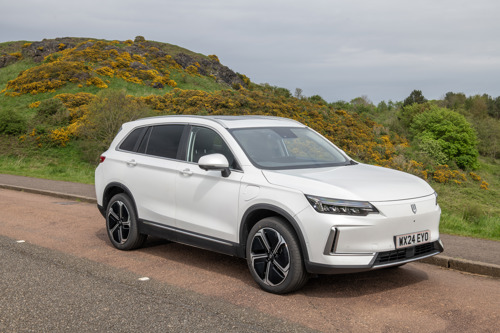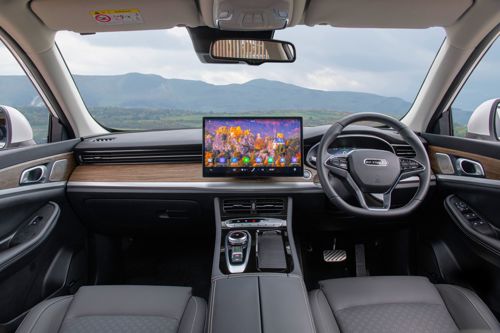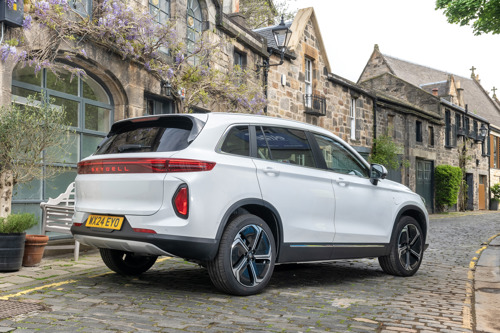Skywell BE11 Review 2026
Skywell BE11 At A Glance
Yes, another Chinese brand you probably hadn't heard of before, tasked with tempting you away from more established marques thanks to a generous kit list and a low-ish price. Do those savings make this entrant worth having over the Skoda Enyaq? We don't think so. Find out why in our full Skywell BE11 review.
If you're struggling to keep track of all the Chinese car brands emerging in the UK, we can empathise. After all, considering the splash Chery alone has made by bringing three to the table — so far — including its umbrella brand plus Jaecoo and Omoda, smaller players such as Skywell risk going unnoticed.
Skywho? Exactly. It started in 2017 as a joint venture between consumer electronics giant Skyworth and Nanjing Golden Dragon Bus, a manufacturer of electric public transport and other vehicles. Calling the resulting entity Nanjing Golden Dragon Car might have helped it stand out, but instead we have Skywell.
Its first car launched in the UK is the Skywell BE11 is also perplexing. Does 'BE' stand for battery electric? And why the 11? Answers on a postcard to...
The name is the least of this electric SUV's worries, though. Its driving range is underwhelming even with the larger of the two battery sizes available, while its disappointingly slow rapid-charging maximum speed is the sort of thing we usually associate with cheap city cars. Its boot capacity is nothing special, either.
Not off to the best start on paper, but unfortunately it only gets worse when the Skywell BE11 is experienced in real life. Build quality isn't brilliant, the onboard technology is dated and it's not great to drive, counting a chronic lack of traction and a choppy ride among numerous issues.
Its safety credentials are also unknown, with no Euro NCAP rating available. How well it could perform is open to debate but various driver assistance systems many new car buyers take for granted are conspicuous by their absence.
You might expect the Skywell BE11 to claw back some ground when it comes to pricing and, in some ways, it does. Although its list price is only a little lower than where the likes of the Peugeot E-3008 and Skoda Enyaq start from, its standard level of equipment is higher, making those established rivals seem basic. What's more, due to very sluggish sales, Skywell is offering substantial discounts on the BE11 for those willing to overlook its shortcomings.
Even with those discounts in mind, as it is the Skywell BE11 isn't a car we can recommend over other relative newcomers such as the Leapmotor C10, let alone the excellent Renault Scenic E-Tech. It might, should significant improvements be in the pipeline, be one to keep an eye on. Other Chinese car manufacturers have been quick to improve their models, so there's some hope of a better BE11 emerging. Skywell has other cars on the way — they need to be leaps and bounds ahead of its debut model's benchmark.
Skywell BE11: Range and charging times
| Skywell BE11 Standard Range 72kWh | 248 miles |
| Skywell BE11 Long Range 85kWh | 304 miles |
The Skywell BE11 Standard Range has a not particularly impressive official range of 248 miles. For comparison, with a similar-sized battery, the Peugeot E-3008 manages 327 miles. The BE11 Long Range manages 304 miles, which considering the size of the battery, is sub-par. During our testing of a Long Range model, we averaged 3.2mi/kWh, which would equate to a range of more like 275 miles.
The numbers get even more disappointing when you look at the DC rapid charging rate, which is just 80kW. That's half what the E-3008 can do and a fraction of the 350kW the Hyundai Ioniq 5 is capable of. Sneakily, Skywell's quoted rapid charging times of 36 minutes for the Standard Range and 45 minutes for the Long Range version aren't for the industry norm of a 20-80% charge, but from 20-70%, making them seem better than they actually are if you haven't read the small print in the brochure.
Skywell BE11 handling and engines
Skywell BE11 2026: Handling and ride quality
A modern car having numb steering is something you're probably bored of reading about at this point, but the Skywell BE11 feels especially vague in the corners. Although there are three selectable modes for the steering weight, none of them feels remotely right.
The suspension could also do with further work. The ride quality is firm and choppy and never seems to settle, although we wouldn't go so far as calling it harsh. Considering this feeling of stiffness, it's odd to then corner boisterously in the BE11 and find that it still leans over quite a bit.
The brakes are effective enough but the calibration of the pedal is poor. There's a sharpness to its response that makes it hard to be smooth, especially when manoeuvring at slow speeds.
Tyre noise is suppressed to an acceptably low level but wind is all too audible at cruising speeds. Also, opening the panoramic sunroof results in a nasty buffeting sound similar to what you hear when opening a rear window on a car. We've not experienced this with similar equipment on any other cars in recent years, so we can only assume it's an issue with the way air is poorly managed when the Skywell's roof is opened.

Skywell BE11 2026: Engines
Regardless of battery size, the Skywell BE11 is powered by a single, front-mounted electric motor producing 204PS and 320Nm of torque. The 0-62mph time is a respectable if not particularly scorching 9.6 seconds, while its top speed is electronically governed to 93mph.
Despite this modest performance, the BE11 struggles to rein it in. Its front wheels spin-up with little provocation, especially with the steering pointing other than straight ahead, accompanied by embarrassingly loud tyre squealing. And that's with the electronic stability control fully on.
What's most disconcerting is the feeling of the accelerator still being applied for a moment or two when you've lifted off the pedal. Even when forward momentum does finally bleed off, it does so in a jerky, unpleasant manner.
Neither is it great when you're accelerating from botha standstill or at speed, with a noticeable delay between putting your foot down and anything actually happening. Pulling onto roundabouts and out of side turnings is a frustrating experience, even ignoring the unintended wheelspin that comes after the pause.
Oddly, it's possible to change the level of regeneration by individual percentage points, meaning, yes, there are 100 to choose from. Even 100% does give anywhere close to one-pedal driving, though.
Skywell BE11 2026: Safety
The Skywell BE11 is yet to be crash-tested by Euro NCAP. Regardless of how well the structure might perform if it is ever assessed by the safety body, we suspect the BE11 wouldn't be rated highly thanks to its eyebrow-raising lack of various driver assistance systems beyond a 360-degree parking camera.
There's no adaptive cruise control, lane-keeping assistance, blind-spot detection or traffic sign recognition technology fitted to it. There is a speed limit warning, but rather than determining speed from road signs or navigation data, it's set manually by the driver.
Skywell BE11 2026: Towing
If you hoped to tow using a Skywell BE11 then prepare for disappointment — it hasn't been homologated to tow a trailer of any capacity.
Skywell BE11 interior
Skywell BE11 2026: Practicality
The Skywell BE11's 467-litre load space is nothing to write home about when the Skoda Enyaq offers 118 litres more and the Peugeot E-3008 has an additional three litres over that total at 588 litres. Yes, you can fold the 60/40-split rear bench down to open up more space, but it doesn't sit anywhere near flat. Adding further complexity to the operation, it's necessary to first lift the rear seat base up to access and unplug an electrical connection when maximising the cargo area.
Once you've gone through all that rigmarole, the total space available in the BE11 is 1608 litres when loaded to the ceiling — you may see a figure of 1141 litres elsewhere, but that's just to the window line. A similarly configured E-3008 offers 1663 litres, while the Enyaq provides 1710 litres with its rear seats down.
Rear headroom is supplied in abundance and the legroom back there is incredible, which might explain why the boot space is on the low side.
There's also an okay-sized compartment under the from central armrest, which is cooled as part of the air conditioning circuit. 
Skywell BE11 2026: Quality and finish
The first thing we noticed when climbing aboard the Skywell BE11 was that the glovebox didn't shut properly, leaving a noticeable gap all the way around. There was also inconsistency between the shutlines of the two rear doors, with the passenger side one sitting proud of the other bodywork around it to the point of not looking like it was properly closed.
Inside, the wood trim looks decent enough but there's a cheap-looking and unpleasant-feeling textured vinyl material cladding much of the cabin. It's also loose in places, rippling as you firmly run a finger along it. Parts of the dashboard creak when pressed and there was a persistent rattling coming from somewhere in the back of the car when driving.
Skywell BE11 2026: Infotainment
While the Skywell BE11's 12.8-inch multimedia touchscreen sounds competitive enough, the system used is very poor. It has the feeling of an aftermarket setup and not a particularly good or recent one at that.
Responsiveness from the touch screen isn't great and the integral navigation is basic both in terms of its aesthetics and its operation. Getting it to recognise an address is a struggle, the offering of points of interest is patchy, plus several newer roads are completely absent from the map. The TurboDog 9 loading screen that appears when the nav boots up might also cause a smirk or two.
Wireless Android Auto and Apple CarPlay are both standard but we didn't manage to get this working and the Bluetooth tech is a struggle as well — we had to delete and re-pair our phone with every drive. The most laughable tech element, has to be the DAB radio. It isn't integrated into the main system, with Skywell instead fitting a USB dongle with an ugly stick-on windscreen antenna. The audio quality is poor and the signal woeful. It doesn't show the logos of most BBC stations and has to be turned back on each time you start the car.
The USB assortment is odd, with two sockets for rear seat passengers and only one for those in the front. Also, they're all the older style USB-A, rather than the now common USB-C and the charge rate of the socket in the front was very slow. There is a wireless phone charging pad which needs to be switched on via the infotainment screen.
The navigation screen is extremely bright by default and doesn't dim in dark conditions automatically — you have to change the settings manually. The same is true of the instrument cluster if set to the predominantly white theme, although we found the darker, alternative theme worked fine regardless of the time of day.
Skywell BE11 value for money
Skywell BE11 2026: Prices
The Skywell BE11 Standard Range costs £36,995, while the Long Range range version comes in at £39,995. Considering the high specification levels — poor standard safety equipment aside — that seems like reasonable value when the most basic Skoda Enyaq with the smaller battery starts from nearly £37,510 and goes all the way up to £52,000 in its most expensive form.
The Skywell doesn't undercut the likes of the Enyaq anywhere near enough to make up for its deficiencies at its regular price. Just as well that you can pick up one for substantially less. Having already been offering a £6000 deposit contribution, Skywell decided to match the government's Band 1 Electric Car Grant (ECG) of £3,750, bringing the total discount to nearly £10,000 — not far off a third off.
We've also seen pre-registered examples with as much as £14,000 off the brand new price. Whether these deals are enough to get more customers in the door remains to be seen, with sales for the fledgling brand proving slow thus far. If price is that much of an issue, we'd recommend spending the same money on a used electric car.

Skywell BE11 2026: Running Costs
Buying an EV no longer gets you out of paying Vehicle Excise Duty (VED), so it's the same flat rate of £195 a year for the Skywell BE11 as it is any other car. All versions cost under £40,000, though, so you won't have to worry about the Expensive Car Supplement — the so-called luxury car tax — of £425 annually from years two to six.
Insurance is likely to be a good chunk more expensive than rivals, with the BE11 sitting in a conspicuously high 43, a place which we'd normally associate more with much faster, more premium vehicles. The Skoda Enyaq, for example, starts from group 23 for the entry-level models, while even the vRS performance model is a good few groups lower than the BE11 in group 39.
Satisfaction Index
 What is your car like to live with?
What is your car like to live with?
We need your help with our latest Satisfaction Index, so that we can help others make a smarter car buying decision. What's it like to live with your car? Love it? Loath it? We want to know. Let us know about your car - it will only take a few minutes and you could be helping thousands of others.
Help us with the Honest John Satisfaction Index nowSkywell BE11 models and specs
The Skywell BE11 is offered in a single, unnamed trim level, regardless of the battery capacity fitted.
Standard equipment for the Skywell BE11 includes:
- LED headlights
- Dark-tinted rear side windows
- Panoramic roof
- Electrically adjustable, folding and heated door mirrors
- Keyless entry/start
- 19-inch diamond-cut wheels
- 12.8-inch touchscreen infotainment system
- 12.3-inch digital instrument cluster
- Wireless Apple CarPlay/Android Auto
- Electrically adjustable front seats
- Interior ambient lighting
- Wireless smartphone charger
- Front and rear parking sensors
- 360-degree parking camera
- Cruise control
Model History
May 2024
Skywell BE11 preview
Manufacturing electric cars is a complex business but relative to producing those propelled by combustion engines, it’s a simpler undertaking. Together with an abundance of the raw materials required for battery production on their doorstep, this has encouraged a number of new Chinese companies to diversify into EV production. One of the most recent to arrive on the British market is the Skywell BE11.
With its first model sold here, Skywell seems to be trying something different from other still-fresh Chinese brands that have sought to catch British car buyers’ collective attention. While BYD majors on advanced technology, GWM went with bold styling for its Ora 03 and Leapmotor’s championing value for money, other than being an electric, family-sized SUV, the BE11 seems... ordinary.
That’s far from a criticism of Skywell’s approach — after all, new tech, whacky designs and low prices can each be off-putting to car buyers, the majority of whom have inherently conservative tastes. So long as a car’s reliable, safe, inexpensive to run and easily connects with their phone, most people are happy. Granted, it’s hardly stuff upon which aspirations are made, but they could prove to be attributes that help the BE11 gain a market foothold.
Nevertheless, the array of alternative electric SUVs of a similar size to the Skywell BE11 seemingly becomes broader by the month with the well-regarded ones including — but not limited to — the super-practical Renault Scenic E-Tech, the functional excellence of the Skoda Elroq and the intriguingly Tesla-like new XPeng G6.
Appearance-wise the Skywell BE11 isn’t especially distinctive, with a few visual cues that might remind you of that car here or this car there. It’s the kind of generic look that you tend to see on those brandless cars used in insurance adverts on telly. Overall, it’s fine and the BE11’s bluff, grille-less nose hints at it electrical power in a manner similar to other, more established marques do.
It’s a similar story inside this five-seater SUV — what the Skywell lacks in design flair, it makes up for with sensibly-sited controls, including a smattering of physical buttons on the dashboard and steering wheel spokes, although most of the nuanced settings for the climate control are located within the 12.8-inch multimedia touchscreen display.
Perhaps the only interior feature that many could find objectional are the expanses of fake wood panelling across the width of the dashboard as well as all four passenger doors. Try and consider it a positive as it evidently reduced the temptation to grace those areas with glossy black plastic surfaces that would soon be harbour more fingerprints than a crime scene investigator’s lab.
As there’s just a solitary, nameless, Skywell BE11 trim level the trick timber’s your only choice, as is the black faux suede and leather seat upholstery. In fact, the only personalisation on offer is which of the four paint options — from a selection of solid white and metallic black, blue and grey — you prefer, with no cost difference between them.
Where a more fundamental degree of choice for Skywell BE11 fanciers lies is between the 72kWh and 86kWh battery sizes. According to the WLTP Combined cycle tests, the smaller option provides a range of 248 miles, the larger capacity increasing that to 304 miles.
When using a DC rapid charger, the BE11’s on-board charger limits the energy flow to a disappointing maximum of 80kW, so although the recharging times of 36 minutes for the 72kWh battery and 45 minutes for the 86kWh version don’t sound too bad, note that’s only for elevating the state of charge from 20-70%.
Skywell quotes AC domestic wallbox recharging times of 4.5 and 5.5 hours respectively, but again they’re for 20-70% and for an 11kW connection which most people’s homes don’t have. Times aren’t provided for the far more common 7kW domestic hook-up, but something in the order of 12 hours for a flat to full recharge of the smaller battery would be in the right ballpark.
Regardless of which of the battery choices you decide upon, Skywell’s slimline model mix means there’s only one drive option. It’s a 204PS electric motor driving the front wheels via a single-speed transmission, with its 320Nm of torque sufficient for a 0-62mph time of 9.6 seconds for both versions, despite the 86kWh BE11 being 50kg heavier.
Order books for the Skywell BE11 opened in October 2024 with the first cars in customers’ hands already. The Standard Range 72kWh version costs £36,995 with the Long Range 86kWh version setting you back a further £3000.
Keep this page bookmarked for updated news on this electric SUV and to read our comprehensive Skywell BE11 review in the months ahead.
January 2026
Upgraded 2026 Skywell BE11 prices start at £31,990
Skywell has announced that orders are now open for the upgraded BE11 SUV. Prices start from £31,990 and first deliveries are expected in January 2026.
Although only being on sale for a year, the BE11 has received what Skywell describes as 'a comprehensive revision' for 2026 based on feedback from journalists and consumers.
New safety features include adaptive cruise control, automatic emergency braking, drowsy driver alert and traffic sign recognition, while the BE11's new lane keep assist, lane departure warning and blind spot detection have been specifically developed in the UK and calibrated for UK roads.
Comfort improvements include heated and ventilated front seats, driver's seat memory settings and electric lumbar adjustment, while the interior also gets ambient lighting, a revised 220v vehicle to load (V2L) three-pin plug socket, a second USB charging port in the front and rear and an optional 15.6-inch infotainment screen.
The battery and powertrain options remain the same. The BE11 Standard Range uses a 72kWh NMC battery for a 248-mile range, and the Long Range features an 86kWh battery for a range of 303 miles. Both models use a BYD-sourced 204PS electric motor.
Despite the extra equipment, prices have also been significantly reduced. The BE11 Standard Range 72kWh now costs from £31,990, down from £36,995 and the BE11 Long Range 86kWh costs from £34,990, rather than £39,995.









 High level of standard equipment. Long warranty. Exceptional rear legroom.
High level of standard equipment. Long warranty. Exceptional rear legroom.
 Poor ride and handling. Infotainment has dated, aftermarket feel. So-so build quality.
Poor ride and handling. Infotainment has dated, aftermarket feel. So-so build quality.





